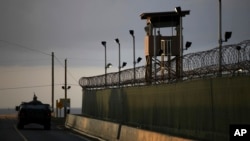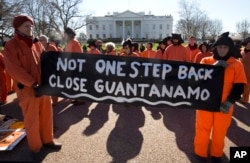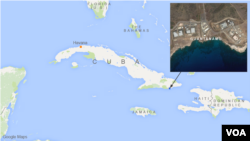The United States has held 779 suspected terrorists at its military prison in Guantanamo Bay, Cuba, since the 2001 al-Qaida attacks on New York and Washington. Now, however, the focus is on what to do with the remaining 91 people detained there, including 35 who have been cleared for release but are still being held as the U.S. searches for countries willing to accept them.
With U.S. President Barack Obama offering a plan Tuesday to close the prison, advocates who have long lobbied for the closure cataloged the status of the remaining prisoners.
A group called Close Guantanamo - a collection of lawyers, journalists and retired military personnel - says there currently are 46 Yemeni nationals at Guantanamo, 12 Saudi Arabians and eight Afghans. There are smaller numbers from Tunisia, Libya, Tajikistan, Morocco, the United Arab Emirates, Pakistan, Algeria, Russia, Mauritania, Malaysia, Indonesia, Kenya and Somalia.
Hundreds of others once held at Guantanamo after being captured while fighting U.S. forces in Afghanistan, Iraq, Pakistan and elsewhere have been released over the years to other countries, including 147 by Obama.
Aside from the 35 who have been cleared for release but are still being detained, U.S. officials have recommended that the others be transferred to a prison in the U.S. or prosecuted before U.S. military commissions. In announcing his base closure plan, Obama said some of the Guantanamo prisoners also could be tried in U.S. federal courts, where government prosecutors have won several high-profile convictions against terrorists and lengthy prison terms.
Interrogation techniques
U.S. legal analysts say the prosecution of some of the Guantanamo suspects is legally problematical since some were subjected to enhanced interrogation techniques, either overseas when they were captured or at Guantanamo. They included waterboarding that simulated drowning. The administration of former president George W. Bush authorized the use of waterboarding, but Obama concluded it was torture and banned its use.
The detention of the suspected terrorists at Guantanamo is but one chapter in the history of the oldest existing U.S. base outside its own territory.
The U.S. has controlled the 118-square-kilometer site on the southeastern tip of Cuba since 1898, when Spain ceded control of Cuba to the United States at the end of the Spanish-American War. In subsequent treaties in 1903 and 1934, the U.S. recognized Cuba's "ultimate sovereignty" over the land, while maintaining "complete jurisdiction and control" for Washington, a perpetual lease that can be voided only by mutual agreement.
The U.S. naval presence at the site has endured for more than a century, even as Cuban revolutionary Fidel Castro demanded that the U.S. return the land to the communist nation after seizing power from the U.S.-supported dictator Fulgencio Batista in 1959. Now, even as Obama has renewed diplomatic and trade links with Havana and Castro's brother, President Raul Castro, after more than five decades of hostilities borne of the Cold War, the U.S. has not signaled any intention of giving up the site along the Caribbean coast.
In 1903, U.S. President Theodore Roosevelt leased the site for the annual payment of 2,000 gold coins, less than $3,400; but, since 1959, Cuba has never cashed the check for the lease payments.
In his early years as the Cuban ruler, Fidel Castro threatened to kick the U.S. Navy off the Guantanamo compound if Washington continued to interfere with the Cuban economy, but also acknowledged that if he took military action, the U.S. would use it as a pretext to invade and overthrow him. In 1964, Castro shut off water to the base, but the U.S. responded by building its own water and power plants.
By the 1990's, the Guantanamo base was used as a refugee camp, housing 20,000 Haitians fleeing a 1991 coup in the Port-au-Prince government and 30,000 Cubans intercepted at sea as they fled the Castro regime. Many of them eventually returned to their homelands or were allowed to emigrate to the United States, where a large Cuban exile community emerged in the southeastern state of Florida, 145 kilometers off the coast of Cuba.
As al-Qaida terrorists flew commercial jetliners into the World Trade Center in New York and the Pentagon just outside Washington on September 11, 2001, Washington quickly looked again to Guantanamo. The U.S. needed a place to detain the hundreds of terrorism suspects and battlefield combatants it was capturing in Afghanistan, Iraq, Pakistan and elsewhere in the Middle East as it embarked on what Bush described as a global war on terrorism.
Bush declared in 2002 that the detention center was not subject to the legal constraints of the Geneva Conventions, but photos and accounts from the facility surfaced that suggested the detainees were being interrogated in ways that critics said was tantamount to torture. Eventually, the U.S. Supreme Court ruled that the detainees were entitled to minimal legal protections under the international conventions covering the legalities of the conduct of war.
Bush, like Obama, eventually called for closing the Guantanamo prison, but Congress enacted legislation banning the transfer of the detainees to prisons in the U.S., which Obama now hopes to negotiate a way around to be able to close the facility before he leaves office in January 2017.












